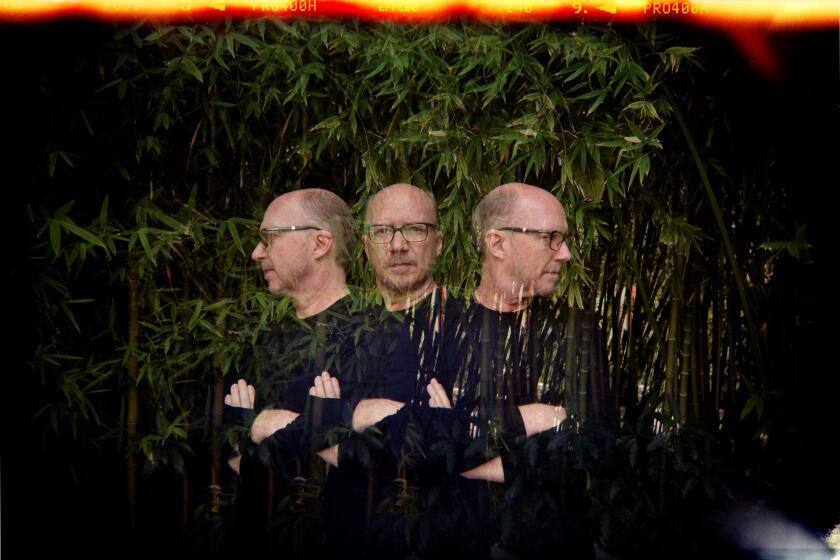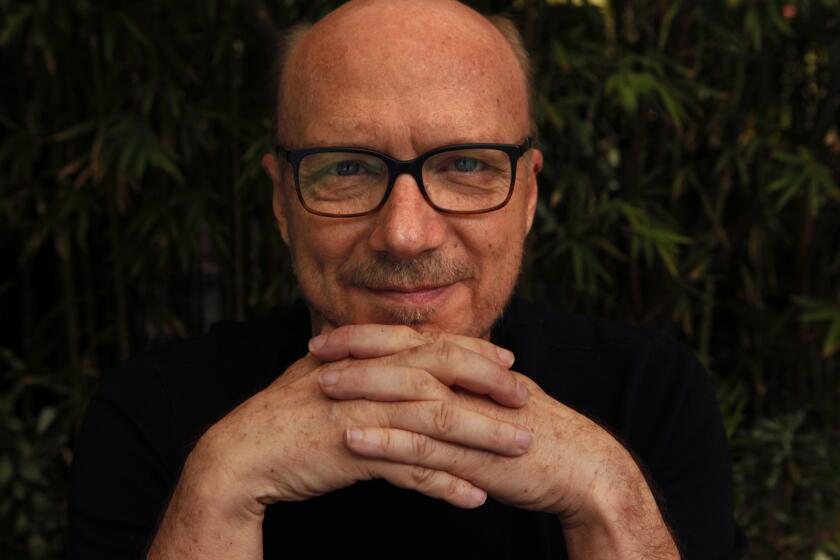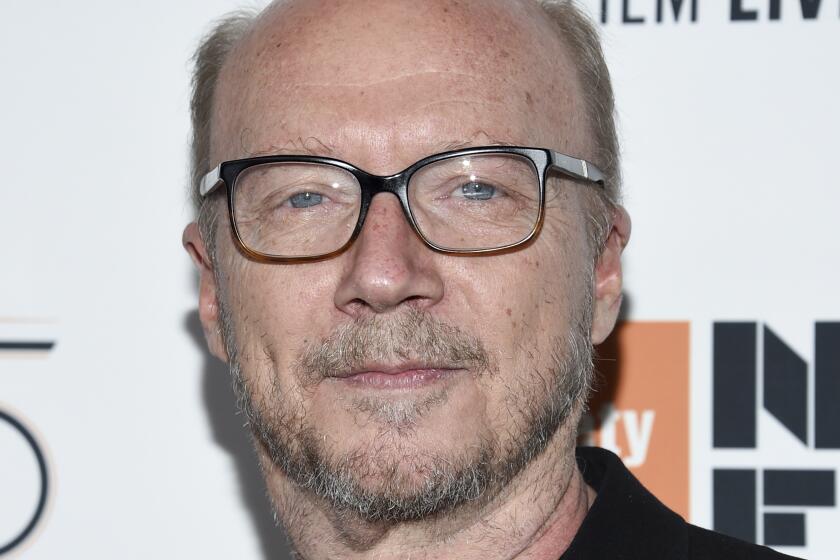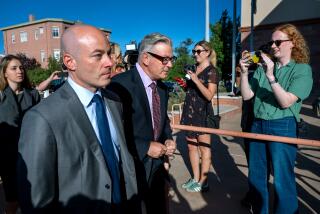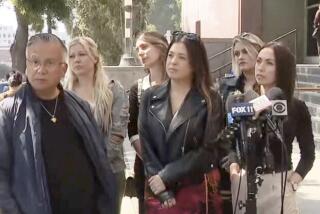Publicist’s rape case against director Paul Haggis opens in New York
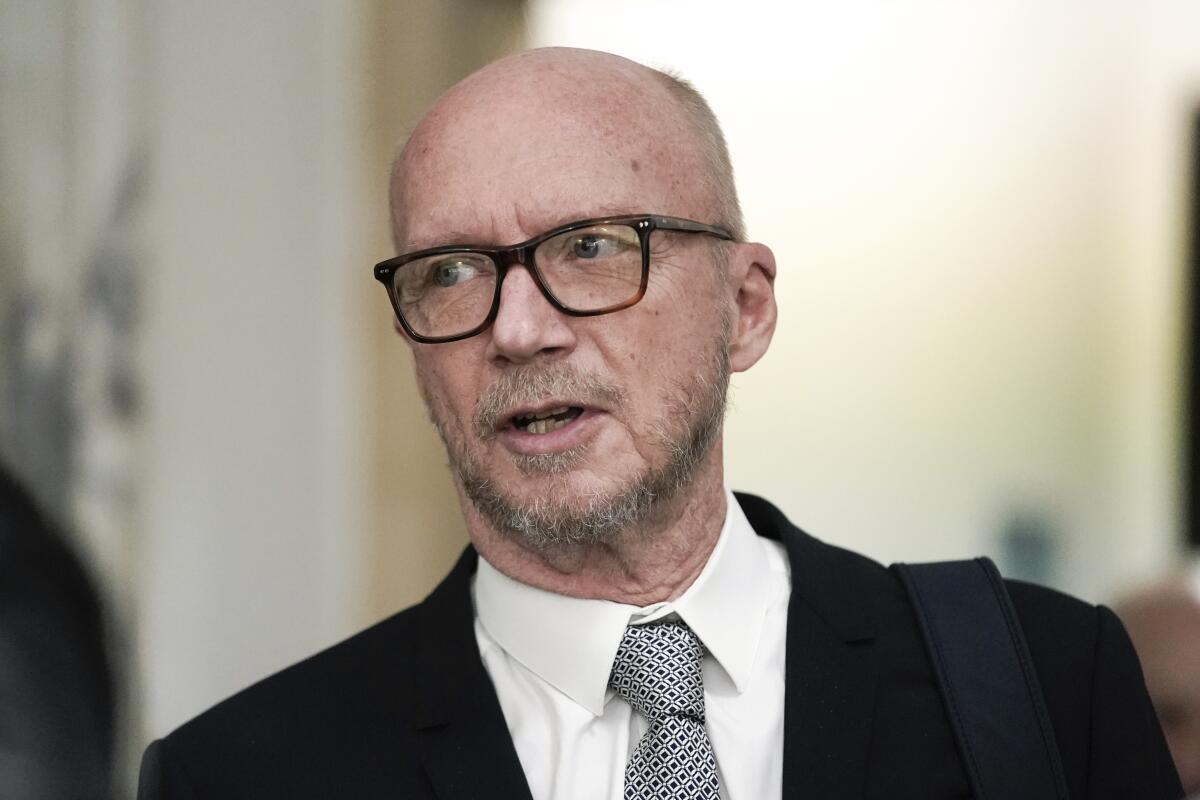
- Share via
NEW YORK — Jurors got their first look Wednesday at a lawsuit that pits Oscar-winning moviemaker Paul Haggis against a publicist who alleges that he raped her, the latest in a lineup of #MeToo-era trials involving Hollywood figures this fall.
Opening statements in the civil case against Haggis began Wednesday in a New York state court. The federal court next door is housing a trial in a lawsuit accusing Oscar-winning actor Kevin Spacey of sexual assault. In Los Angeles, former film mogul Harvey Weinstein and “That ‘70s Show” actor Danny Masterson are fighting criminal rape charges at separate trials down the hall from each other (Weinstein is already serving a 23-year sentence on a New York conviction). All of the men deny the allegations.
The confluence of trials is a coincidence, but it makes for something of a #MeToo moment five years after allegations against Weinstein triggered a dam break of sexual misconduct accusations in Hollywood and beyond and catalyzed an ongoing movement to demand accountability.
“We’re still very early on in this time of reckoning,” Debra Katz, a Washington, D.C.-based lawyer who has represented many sexual assault accusers, said. She isn’t involved in any of the four trials.
As writer-director Paul Haggis is ordered to stay under house arrest in Italy, where he’s accused of sexual assault, here’s a look at how he got here.
In an unusual turn, both Haggis’ case and Masterson’s also have become forums for scrutinizing the Church of Scientology, though from different perspectives.
In the case against Haggis, publicist Haleigh Breest claims that the “Crash” and “Million Dollar Baby” screenwriter forced her to perform oral sex and raped her after she reluctantly agreed to a drink in his apartment after a 2013 movie premiere. Haggis maintains that the encounter was consensual.
Breest never went to police, but soon after the encounter, she gave friends an account of what happened, sending text messages that both her lawyers and Haggis’ attorneys say bolster their case.
“He was so rough and aggressive. Never, ever again ... And I kept saying no,” read one text that her lawyer Zoe Salzman highlighted in her opening statement. She said the encounter shattered Breest emotionally, but that her client didn’t go public until after Haggis condemned Weinstein amid the allegations against him in 2017.
A judge in Italy finds no reason to continue investigating Paul Haggis after a woman accused the Oscar-winning director of sexual assault in June.
“The hypocrisy of it made her blood boil,” Salzman said.
Haggis’ attorney Priya Chaudhry pointed jurors to other parts of the same text exchange, saying that Breest added “lol” — for “laughing out loud” — when she mentioned performing oral sex, and that she said she wanted to be alone with Haggis again to “see what happens.”
“I don’t care too much. I just hope I don’t now have enemies” professionally, she wrote, according to Chaudhry. She argued that Breest falsely accused the filmmaker of rape to get a payout.
“Paul Haggis is relieved that he finally gets his day in court,” Chaudhry said.
In an interview with Italy’s La Repubblica, Paul Haggis asserts his innocence in his sex-abuse case and doesn’t rule out a connection to Scientology.
Only Breest is suing Haggis, but jurors will also hear from four other women who told Breest’s lawyers that Haggis sexually assaulted them, or attempted to do so, in separate encounters between 1996 and 2015. The jury won’t hear, however, that Italian authorities this summer investigated a sexual assault allegation against him, which he denied.
“Mr. Haggis used his storytelling skills and his fame to prey on, to manipulate and to attack vulnerable young women in the film industry,” Salzman told jurors. “He doesn’t stop when women say no.”
Haggis’ attorney argued there’s another explanation for the allegations.
Promising “circumstantial evidence,” she suggested that Scientologists ginned up Breest’s lawsuit to discredit Haggis after he split with the church and became a prominent detractor.
This article was originally on a blog post platform and may be missing photos, graphics or links.
The church denies any involvement, and Breest’s lawyers have called the notion a baseless conspiracy theory that lacks proof of any connection between the religion and Haggis’ accusers.
“Scientology has nothing to do with this case,” Salzman told jurors. The church has said the same.
Haggis says he was Scientologist for three decades before leaving the church in 2009. He slammed it as “a cult” in a 2011 New Yorker article that later informed a book and an HBO documentary, and he foreshadowed that retribution would come in the form of “a scandal that looks like it has nothing to do with the church.”
The church has repeatedly said that Haggis lied about its practices to grab the spotlight for himself and his career. The church didn’t respond to a request for comment.
Although it is not the case in most places on Earth, it is hard to live in Los Angeles, especially in Hollywood, and not be aware of the Church of Scientology.
Masterson’s lawyer, meanwhile, is asking jurors to disregard the actor’s affiliation with Scientology, though prosecutors say the church discouraged two of his three accusers from going to authorities. All three are former members.
Haggis got his Hollywood start as a TV writer and moved on to movies, including “Million Dollar Baby” and “Crash,” which won back-to-back Academy Awards for best picture in the mid-2000s. The Canada-born filmmaker also directed and was a producer of “Crash,” which garnered him and Bobby Moresco the original screenplay Oscar in 2006.
In a sworn statement last year, Haggis said his career nosedived and his finances cratered after Breest sued him in 2017.
The Associated Press does not usually name people alleging sexual assault unless they come forward publicly, as Breest has done. She is seeking unspecified damages.
Associated Press writer Deepa Bharath contributed from Los Angeles.
More to Read
Only good movies
Get the Indie Focus newsletter, Mark Olsen's weekly guide to the world of cinema.
You may occasionally receive promotional content from the Los Angeles Times.
